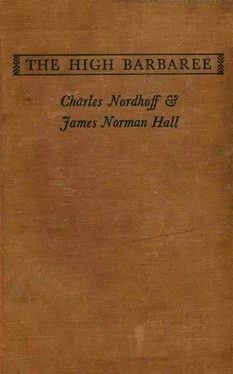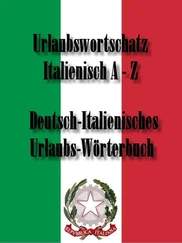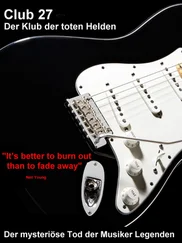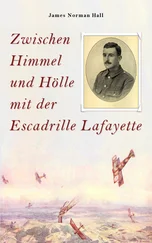Mauriac glanced at the luminous dial of his wrist watch.
“It’s a quarter to ten.”
“No later than that? . . . Gene, there’s one thing we’ve got to get used to: minutes as long as hours.”
“The story’s a big help; they pass a lot faster while you’re talking.”
“Pretty quiet out here, isn’t it?”
“I was thinking of that. Remember how sick we got of the perpetual sound of engines, back at Guadal? Sometimes I’d have given a month’s pay for a quarter of an hour of pure silence.”
“And now we’ve got nothing else but.”
“Would the sound of a pair of Pratt and Whitneys be celestial music right now!”
“Lay off that! We’ll never hear it when we’re expecting to, that’s sure.”
“I know, but this waiting’s getting me down. You get so damned impatient wanting to make something happen. . . . If only we knew whether Meyers got our position through to Henderson before he was killed!”
“Yes, it is pretty rough, not being sure. What do you suppose they’re doing back at Guadal?”
“Shut up, Alec! I’m at Westview, or I was. Go back there and straighten me out.”
“Okay, but you’re putting another nickel in me. Get me started on boyhood and my Uncle Thad and I don’t know when to stop.”
“You’ve got me guessing . . . about the High Barbaree, I mean. How does that come in?”
“Keep your shirt on. I’m coming to it. First, I want to tell you a little more about Nancy Fraser.”
Nancy meant a lot to me all through those early years. The Frasers had no son and my parents no daughter, so the pair of us lived between the two homes and were members of both families. I was two years older than Nancy, and she sort of took the place of a sister. She hero-worshiped Uncle Thad, the same as I did, and he thought the world and all of her.
“She was an independent little thing; I couldn’t get away with bossing her around. She wasn’t a tomboy, but she had any amount of guts. She would ‘take a dare’ without thinking twice about it. Once I got into an awful mess with both sets of parents by daring her to climb with me up the narrow iron ladder to the top of the standpipe, as we called it—the town water tower which is one hundred and ten feet high. I went first, and before we were halfway up I was sorry I’d given the dare. The top of the standpipe was a long way off, and as I glanced down I had a sick feeling at the pit of my stomach. Nancy looked like a little doll against the great column of riveted steel, but she was climbing on, slow but sure. We reached the railed platform on top, but I can’t say that we got much kick out of the view spread out beneath us. We were too scared. At last Nancy said, very quietly: ‘I’m going to start down now, Alec.’ That was real pluck.
“We’d not been seen going up, but someone had spotted us on top, and now a crowd of terrified parents and neighbors had gathered at the foot of the ladder. They were afraid to call out for fear they’d rattle us, but we could see their white faces turned toward us. Nancy’s father climbed up for her and she had barely strength enough left to clasp her arms around his neck as he carried her down the last thirty or forty feet. I made it all the way, but my arms and legs felt numb by the time I reached the ground. I deserved a good hiding, but I guess my dad thought I’d learned a lesson that would stick, and so it did. I never again gave Nancy that kind of a dare.
“She had the good sense not to butt into boys’ games, but at most other times I liked having her around better than any boy. In summer I spent more time on the Fraser farm than I did at home. We both had horses to ride. I still like to remember the times when we helped drive cattle from the farm to the loading pens by the Westview depot. But I’m off the course again: I’ll get back to why this old Dumbo wears her high-sounding name, and that’s connected with my Uncle Thad.
“He was lousy at writing letters. Mother would hear from him two or three times a year from some faraway port, when, I suppose, he would have a real touch of homesickness for Iowa and his own flesh and blood. And now that he’d come to know Nancy and me, he would send us gifts that made us popeyed. Once, from a Norwegian port, he sent me a model of a Viking ship, with a striped silk sail, a carved prow—everything as it should be, even to the Vikings’ shields ranged along the gunwales. Maybe you can imagine what that meant to me. But he said nothing about coming home and he never mentioned the canoe promised for my twelfth birthday. How I longed for that canoe! The thought of it was always in the back of my mind, particularly in the spring of my eleventh year when the Chaquaqua River overflowed its banks again.
“I call it a river, but the Chaquaqua was little more than a prairie slough that winds in loops and turns in a general south-easterly direction. In a dry summer there was little water in it; even our old swimming hole would be no more than chin-deep. But it was all the river we had, and to say that it meant a lot to us kids is putting it mildly. A fringe of timber land follows it most of the way through our part of the country and this was a wonderful place for spring flowers. Hepaticas, violets, Dutchman’s-breeches, bloodroots, May-apple blossoms, jack-in-the-pulpits grew all through those bottom lands and the bordering hills south of the river. But best of all were the lady-slippers because they were so hard to find. It was a real event to stumble across one. I always gave mine to Nancy.
“She looked forward to my twelfth birthday as much as I did. We counted the weeks, then the days. Mother tried to break it to me that I might be disappointed. ‘Now don’t be too sure, Alec,’ she said. ‘You know how it is with your Uncle Thad: he may not be able to come just when he said he would.’ But he’d promised, and I was dead certain that he’d show up on April twenty-second. Nancy and I met both westbound passenger trains that day but there was no Uncle Thad, and no canoe. There was a disappointment that topped any I’d known, and to make it worse, heavy spring rains had again flooded the bottom lands for miles, out north. There could have been no sadder pair of kids in the State of Iowa than Nancy and me. The Frasers, to relieve a little the awful ache in my heart, invited me out to their farm to spend the spring vacation. I passed the first few days of it there; then, early one morning, my father called for me in the car. He said that Nancy and I were wanted at home, but he didn’t explain why.
“We were a bit puzzled by Father’s manner, but we didn’t suspect anything. Instead of taking the direct road home, Dad turned off toward the river; he said he had a call to make on the way. Between two wooded hills bordering the river where the Chaquaqua makes a wide bend there is an enchanting little valley we called ‘the cove,’ carpeted with wild flowers at that time of year. Dad halted the car at this spot.
“ ‘Alec,’ he said, ‘what about you and Nancy and me picking some hepaticas and violets to take home to your mothers? It won’t take us ten minutes.’
“The road was no more than a hundred yards from the cove. Dad led the way down the slope and disappeared among the trees. Nancy and I followed, gathering wild flowers as we went. And then I spotted a lady-slipper, and you’d have to know how rare they are in our woods to understand the thrill it was to find one. I called Nancy and gave it to her. I still remember how she handled it as though she couldn’t believe it was real. Then we heard my dad calling from the cove. We hurried down, and, as we came within view of the river, there was Uncle Thad, sitting in my canoe with a paddle laid across his knees.
“The picture I then saw has been stamped in memory since that day, to stick there as long as I have memory. There was a faint mist in the air, and the April sunshine slanting through the branches of the trees, just coming into leaf, had a golden quality. With hepaticas growing so thickly, the air was filled with their fragrance which is the very breath of spring. I’ve seen Maxfield Parrish landscapes that have in them the same quality of ideal beauty that belongs to my recollection of the cove on that April day.
Читать дальше












